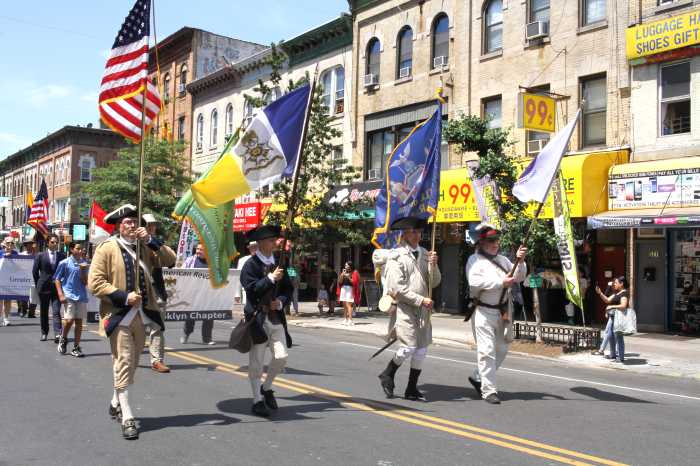Subject:
The Reagans
I’ve followed the controversy over the television film about Ronald Reagan and I’m of two minds about it.
On the one hand it’s great to see Ronald and Nancy Reagan slammed. I was a kid at the time, but I remember they were true vipers. On the other hand, it doesn’t benefit any of us to have history distorted. Reagan spoke out against a bill attacking gays when he was governor of California. Some gay Republicans say that he was not truly homophobic even if he was initially negligent about AIDS and didn’t do enough.
Is that true? Doesn’t it matter if the film is inaccurate and slanted?
Re: The Reagans
First of all, this is Hollywood we’re talking about. Whatever happened to that much heralded “dramatic license?” How many times have we seen the Kennedys lives recounted in ways that have curdled their blood and that of their followers? Where were all the moral arbiters on the right screaming about historical accuracy during the airing of those biopics?
Hollywood has rarely gotten things historically correct––it’s entertainment, for goodness sake––and that’s been true whether the subject is Democrats, Republicans, blacks, women, gays, or elephants on the Serengeti.
That’s why we thankfully have books. And historians. And biographers.
But, even judging by their work, and by what we know so far about the film, it doesn’t seem that “The Reagans,” to be aired on CBS on November 16, is much a stretch, particularly on AIDS and gay issues.
“The Reagans” may of course be high camp––and could outdo Cybil Shepard as Martha Stewart in the Can-You-Top-”Mommie-Dearest?” Sweepstakes––but that doesn’t mean that the depiction is necessarily factually wrong.
All of this became a huge deal when a script was leaked—clearly by Reagan supporters who’d gotten hold of it—to The New York Times last week. The fanatical followers of Reagan are trying to preserve his legacy any way they can. And now that homosexuality is much more accepted in society and the depth and breadth of the AIDS epidemic globally has been well-documented for over 20 years—not to mention the fact that the our current Republican president tries to appear as if he cares a great deal about the epidemic—Reagan’s legacy on AIDS seems even more abominable. Thus, there’s an effort to try to reshape history.
One tactic has been to try to tar the project by going after the actors involved in the film, which seems pretty ridiculous. James Brolin is starring as Ronald Reagan and he is of course married to the anti-Reagan scourge of the right, Barbra Streisand. And Judy Davis, who plays Nancy, has offered some wonderfully bold liberal political positions regarding the current administration and the war on terrorism.
But so what?
Charlton Heston and Arnold Schwarzenegger, both staunch conservatives, have played liberal-minded heroes––”Total Recall,” after all, was about liberating the downtrodden––and they did a pretty good job of it. So I don’t think the actors’ political positions necessarily dictate the politics of the projects they’re involved with, or that of the roles they play.
Let’s look instead at what producers Craig Zadan and Neil Merton––both openly gay––brought to the film’s script regarding gays and AIDS, as least from what we’re told. (There have been reports on Advocate.com that we might now see a re-editing, which I really hope doesn’t happen.) In one scene, Ronald tells Nancy, after she pleads with him to do something about AIDS: “They that live in sin shall die in sin.”
Elizabeth Egloff, a playwright who wrote the final version of the script, acknowledged there that there’s no evidence those words were spoken exactly like that––this is the dramatic license part––but in “Dutch,” Reagan’s authorized biography, historian Edmund Morris writes that Reagan once said of AIDS, “Maybe the Lord brought down this plague,” because “illicit sex is against the Ten Commandments.”
That doesn’t sound so off the mark to me.
As for evidence of pro-gay sentiments by Reagan, it was not during his tenure a governor of California that he spoke out against an anti-gay initiative. It was after he was governor but before he became president, in 1978, when, implored by activists, he spoke out against a state ballot measure, the Briggs Initiative, that would have set the stage for a witch hunt of gay teachers.
But Reagan courted Christian conservatives as he made his second, and successful run for the presidency in 1980, and he is credited with bringing the religious right in big numbers into the then-sagging national Republican Party, where they have stayed for the past quarter of a century. He pandered to them to keep them happy just as AIDS was emerging in the gay community in the early 80s.
Reagan didn’t say the word AIDS for eight years after the disease been identified and while tens of thousands of Americans died from it. And he committed no political or financial capital to stopping the epidemic. It was something he hoped would go away, so that he wouldn’t have to do anything to anger his large Christian right constituency. The problem was that the epidemic only grew bigger.
You can call his inaction negligence, as do those gay Republicans you cite, but in fact it was willful, calculated, and callous. And perhaps his way of rationalizing what he did––or rather didn’t––do about AIDS was to make the religious statements recorded by his biographer, whether he really believed them or not.
One thing that is certain: With the way Reagan is heralded by his supporters and so much of the press, when he dies, we’re all in for the most nauseating tongue bath imaginable, and it will go on for days and days. So, even if this is just Hollywood liberals’ sweet revenge, as the right charges, let’s enjoy it while it lasts. Pass the popcorn!
Michelangelo Signorile hosts a daily radio show on Sirius Satellite Radio, stream 149.
E-mail Mike your questions at mike@signorile.com.

































